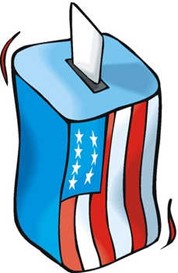Ancestors, Community, and the Vote
 After this week’s tumultuous election, I began to reflect on why I may have voted the way I did. I hope I objectively examined the issues and voted for those candidates who would best represent my views. Yet I cannot help but think that my upbringing and surroundings played a part in influencing my opinions.
After this week’s tumultuous election, I began to reflect on why I may have voted the way I did. I hope I objectively examined the issues and voted for those candidates who would best represent my views. Yet I cannot help but think that my upbringing and surroundings played a part in influencing my opinions.
How did my ancestors think, and what did I hear discussed at home as I grew up? Over years of genealogical research, I have assembled some information about the political leanings of my forbears:
- Caleb Reed (1818-1903), an Illinois farmer. According to the history of Coles County, he was a strong Whig although he never sought political office. The conservative Whig party (1833-1854) was organized by the politician Henry Clay in opposition to the Jacksonian Democrats, and they derided Jackson as “King Andrew”. Appealing to large landowners, the Whigs supported the supremacy of Congress over the President and favored economic protectionism. They opposed Jackson’s Indian removal policies. Many Whigs gravitated to the Republican Party after the demise of the Whig Party. I wonder whether Caleb voted for Republican Abraham Lincoln, a fellow resident of Illinois, in 1860 and 1864. Lincoln’s parents lived near Caleb in Coles County.
- John Carter (1790-1841), another Illinois farmer and neighbor of Caleb Reed. Originally from Tennessee, John had served in the War of 1812 under Andrew Jackson. I do not know how he felt about Jackson and his policies. Was John a Jackson Democrat?
- Bjarne Bentsen (1906-1986), a policeman, later an electrician, who grew up in Montana and lived in several western and Midwestern states. He professed strong support of the Democratic Party.
- Grace Riddle (1896-1976) and Martha Mattila (1906-1977). I find it amazing that when these women, my grandmothers, were born, women did not have the right to vote. That did not come until 1920. Even so, neither of them talked about politics, and I do not know if or how they voted.
- Joyce Bentsen (1929-2000), a schoolteacher from Minnesota. She never disclosed how she voted, but over the years she expressed admiration for Minnesota Democratic native sons Walter Mondale and Hubert “The Happy Warrior” Humphrey.
- My Dad, a petroleum landman. During my lifetime, he usually has expressed conservative views and leaned Republican, not surprising for an oilman. Yet he proudly cast his first vote in a Presidential election for Harry Truman in 1948. He told me that his mother kept a photograph of Democrat Franklin Roosevelt in their home.
These family members obviously did not agree about politics, so I received mixed messages at home. What about the influence of my community?
- I grew up in Wyoming, a politically conservative state. This week nearly 70% of their electorate voted for Donald Trump. Although Wyoming was the first state to grant women the right to vote, they did not do so for progressive reasons. Without women counted as citizens, Wyoming could not reach the requisite number of voters to qualify for statehood in 1890.
- Today I live in the purple state of Colorado where I have been for over 30 years. I reside between very-conservative Colorado Springs, and very-liberal Boulder (referred to by the locals as “The People’s Republic of Boulder”). Ironically, the Libertarian Party was founded in Boulder, so we have that influence as well.
These conflicting views around me all contribute to my political views. I hope I did a good job synthesizing them before I cast my vote this year.